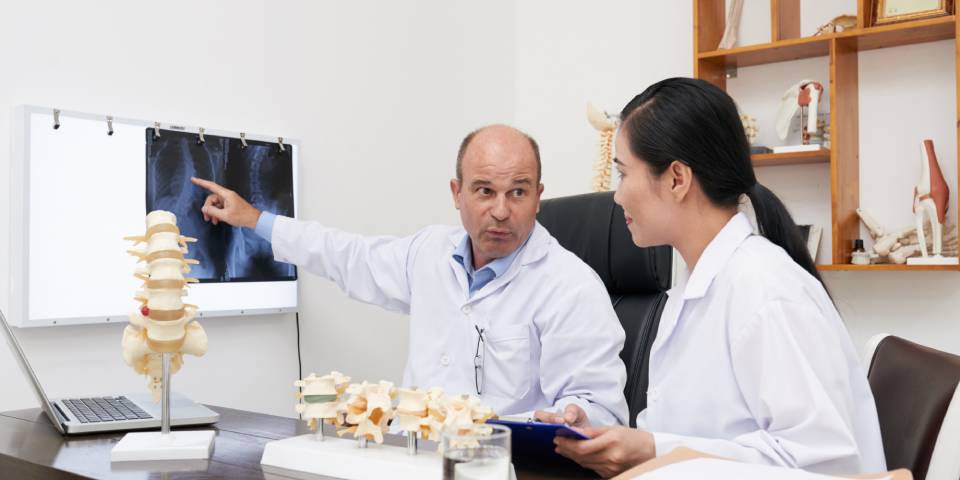
- 16/05/2024
- Dr. Ashwini Gaurav
- 0 Comments
- Blog
5 reasons for visiting an Orthopedic Doctor
Orthopedic pain can disrupt daily life, affecting simple tasks and overall well-being. Dr. Ashwini Gaurav, an orthopedic specialist in Patna, offers expertise in bone and joint health beyond that of a primary care physician. Athletes and those with habitual injuries are frequently complete at recognizing when to seek orthopedic care and understanding signs that warrant technical attention. He also emphasizes the importance of listening to your body and seeking help when pain or limitations surpass normal situations. While a primary care physician may be the first step, specific indicators signal the need for orthopedic evaluation. Understanding these signs enables individuals to pursue diagnosis, treatment, and improved orthopedic health under Dr. Ashwini Gaurav’s guidance.
- Persistent Soft Tissue Damage: Soft tissue injuries, like a sprained ankle, twisted knee, or painful wrist, need immediate treatment using the RICE technique of rest, ice, compression, and elevation. However, it’s advisable to consult an orthopedic specialist, If pain and lump persist after 48- 72 hours. patient soft tissue damage involves ongoing issues with the body’s muscles, tendons, ligaments, fascia, nerves, and blood vessels. These injuries can be caused by unforeseen impacts or repetitious stress. While numerous soft tissue injuries heal with time and proper care, patient damage can lead to habitual pain, stiffness, weakness, and difficulty with day-to-day tasks.
- Chronic Joint Pain: Chronic joint pain refers to patient discomfort or inflammation in one or further joints lasting for an extended period, generally beyond three to six months. Unlike acute common pain, which may be affected by unforeseen injury or temporary inflammation and resolves with time and treatment, habitual joint pain persists over the long term and can significantly impact a person’s day-to-day activities and quality of life.
- Reduced Joint Mobility: When your joints start hindering your capability to move freely and comfortably, it’s a sign that something might be imperfect. A drop in range of motion could indicate arthritis, another common condition, or damage to the common itself. However, it’s doubtful to resolve on its own, and seeking medical attention is judicious If this limitation persists. Ignoring reduced common mobility could lead to further deterioration or the development of fresh complications. This restriction in common movement can stem from a range of causes, similar to injury, inflammation, degeneration, or underpinning medical conditions affecting the joint’s structure and function.
- Everyday Tasks Are Affected : While occasional joint pain is common, it shouldn’t interfere with your daily activities. Tasks like walking, climbing stairs, or even simple routines such as brushing your teeth should be pain-free. If you notice persistent discomfort during these activities, it could indicate a more serious underlying issue. Don’t overlook these signs. Seeking medical attention can help diagnose the problem and enhance your overall well-being. Early intervention is crucial to precluding further complications and conserving your independence and quality of life.
- Tingling Sensations in the Hands or Fingers: Numbness in your hands, particularly in the thumb, pointer, or middle fingers, along with tingling sensations, could be signs of carpal tunnel syndrome. This condition affects the nerve running through your wrist to your forearm, responsible for sensation in those fingers (excluding the pinky). Dropping things frequently might also indicate this syndrome. Carpal tunnel syndrome often develops due to repetitive wrist movements over time.
Your Orthopedic Doctor Visit:
During your discussion with an orthopedic doctor, you will talk over your pain and discomfort, and they’ll proceed to examine the affected area. They’ll assess your range of motion, strength, and overall functionality to understand the extent of your condition or injury. However, fresh tests like X-rays or MRIs may be ordered, If further information is demanded.
After gathering all the necessary information, the orthopedic specialist will unite with you to develop a suitable treatment plan. This may involve nonoperative techniques similar to rest, medicine, injections, or a physical remedy and rehabilitation program. Together, you will work on optimizing strength and flexibility, to return to normal function. The treatment plan may incorporate a combination of remedies to ensure comprehensive care and a successful recovery.
If orthopedic pain or discomfort is impacting your daily life, it’s important to seek help promptly. Reach out to Dr. Ashwini Gaurav’s clinic for expert evaluation and treatment, covering a broad range of orthopedic interventions, including knee replacement, hip replacement, ACL ligament repair, and other technical treatments. Don’t delay in addressing your orthopedic concerns—take the first step toward relief by contacting Dr. Ashwini Gaurav’s clinic today.

